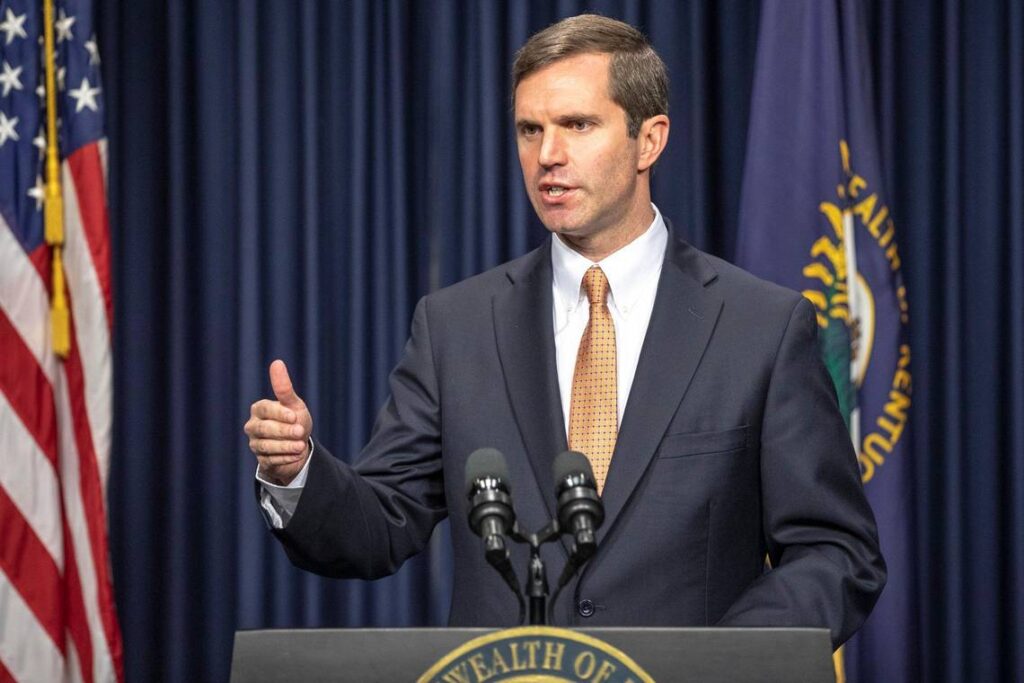Governor’s power in front of Kentucky Supreme Court

Kentucky Gov. Andy Beshear’s COVID-19 orders once again went before the state’s Supreme Court as justices heard arguments Thursday on two cases.
The issue, though, wasn’t the emergency orders themselves as Beshear confirmed later in the day that capacity limits will be lifted. It’s also expected mask requirements will be amended as well, likely to just facilities that care for vulnerable populations, such as healthcare facilities.
Rather, the decisions the Kentucky Supreme Court renders from these cases will impact Beshear and future governors and their abilities to govern during an emergency.
In tweets posted after the hearings, Beshear noted that almost 600,000 people have died in the U.S. because of COVID-19.
“It would have been irresponsible for a governor not to have the authority to take action and save the lives of our people,” Beshear tweeted. “It’s critical future governors have this power too. This isn’t about politics. This is about prioritizing the health and safety of our people in times of need.”
Last November, the state Supreme Court ruled Beshear acted within his powers to issue orders that closed or restricted businesses during the pandemic.
In response, the Republican-led legislature passed a series of bills and a resolution during its session this year to curtail those powers and give lawmakers oversight. The laws limited the scope of a governor’s emergency order capacity.
For example, one new law requires legislative sign-off on any order exceeding 30 days. Another allows businesses to implement an operating plan that meets or exceeds the less restrictive guidelines between the U.S. Centers for Disease Control and Prevention guidelines and the governor.
Beshear, a Democrat, filed suit and received an injunction keeping the laws from being enacted. Attorney General Daniel Cameron, a Republican, then appealed the injunction.
Kentucky Solicitor General Chad Meredith, representing Cameron, told the justices Beshear did not have a valid case to seek an injunction against the new laws.
“The General Assembly has defined the governor’s powers in emergency situations,” Meredith said. “This court said the General Assembly could do precisely that less than one year ago. The General Assembly took the court’s advice, and that is what we’re dealing with here.”
In the first case of the morning, the Beshear Administration appealed an injunction given in April to specific businesses in Georgetown, Frankfort, Lexington and Louisville that precluded the state’s orders from being applied to them.
Amy Cubbage, Beshear’s general counsel, told the justices the case against the governor will soon be moot.
“We know when the new order is signed and issues become effective tomorrow, they are free to operate their businesses as they wish,” she said. “They have no restrictions under the pandemic. Therefore, they will lose standing.”
However, Oliver Dunford, a lawyer with the Pacific Legal Foundation representing Goodwood Brewing Company, Trindy’s and Dundee Tavern, said the governor lost his ability to issue an extension to his orders in March thanks to the new laws the legislature passed.
The new laws do “not violate the separation of powers, but instead defines his authority in times of emergency,” Dunford said.
Chief Justice John Minton told the parties that the state’s top court would make their decisions as quickly as possible in both cases.
This article was originally posted on Governor’s power in front of Kentucky Supreme Court







